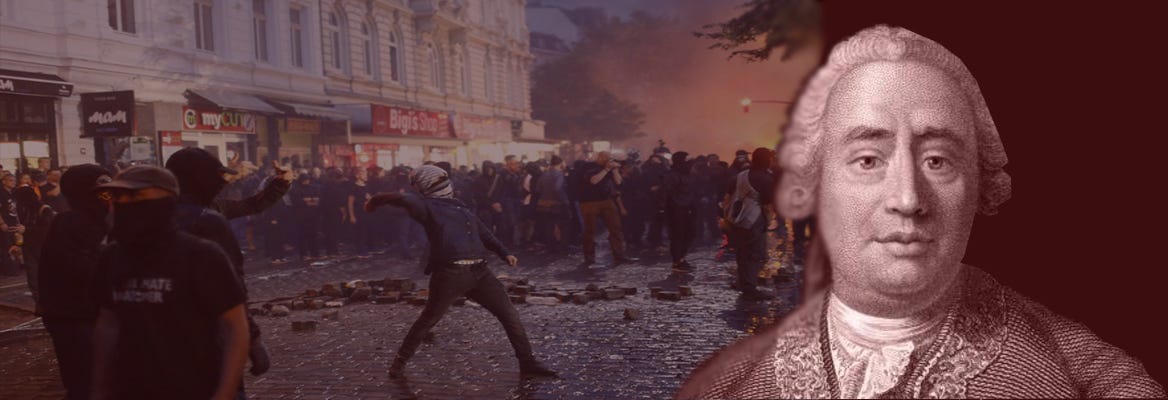Weak Signals
A weekly newsletter about the small signals that get lost in the noise
“The end of a melody is not its goal: but nonetheless, had the melody not reached its end
it would not have reached its goal either."
Welcome back to Weak Signals.
After a longer than expected hiatus, I am back reinvigorated and refreshed for the year ahead.
2020 was trying, but inasmuch as you could, I hope you found the silver lining.
And if you didn’t, 2021 will give you some more practice for a little while yet.
Coming into the weekend, I had aspirations of laying out some larger thoughts for the year ahead, but I have decided to save them until next week. I would be remiss to not at least try and engage the current news cycle which has been transfixed by Wednesday’s Capitol Hill riots. Defiant Trump supporters, urged on by the president, stormed the Capital. Once there, they didn’t seek to overturn a democratically contested election so much as selfie their way through a performative and seditious cosplay. It was pathetic, and we are fortunate that the mobs actions weren’t more deadly and damaging than they were. And they were both.
It beggars to mind to think of the structural and cataclysmic failure of local security forces and in the worse cases, their complicity, in allowing this to happen. In the aftermath, Trump’s presidency and the man will rightfully, especially tarred, both contemporarily and by history with the way he handled his ballot box defeat.
The riots marked were disgraceful, and mark an ignominious end to Trump’s presidency.
As with many things, however, it’s not the action, but the reaction that matters, and this is yet another interruption that will stay.
We are stepping into a new reality so what what I’m outlining below is evolving and I risk being a bit outdated in details. I will try to be is consistent as I can in my conclusions, however.
The first reaction, occurring in real time has seen at all layers of the stack (hosting, eCommerce, messaging, social media) big tech American and Canadian platforms executing, in coordination, a pincer movement on Trump; acquiescing to long standing political pressure to de-platform the president.
Both Facebook and Twitter as of Friday evening banned the president permanently. These actions, above all, limit his ability to stir up dissent and monetize his infamy as he bunkers up for these last days.
On this reaction, if the coordinated move against Trump by big tech stopped with him, I believe even among the staunchest of free speech radicals, there would be sympathy, if not support. After all, if a defeated president is willing to trade in unsubstantiated election fraud conspiracies, culminating in tacit calls for revolution, they no longer have the right to free speech.
As Nasem Taleb says ‘you can’t be tolerant of the intolerance.’
More simply speaking, you can’t allow your liberalism to be used against you.
It is, however, the second reaction that feels a bit more ominous, and far reaching, crazy as that may sound.
Beyond Trump, and again in coordinated fashion, big tech is now exerting pressure on Parler, a Twitter competitor with more porous speech governance favored by the far right. Again, this pressure is in support of the effort to limit Trump’s access to their platform. And in their own ways, all of these companies are threatening to remove Parler’s ability to operate should they not.
With these moves, effectively, big tech has superseded the US government to become the inconsistent arbitrator of acceptable discourse.
In their actions, they are taking what essentially amounts to a war footing against those who do not tow the line - in this case Parler. To dissent from their understanding of it acceptable discourse means, that a business will no longer be able to effectively operate.
Now make no mistake, I’m not questioning whether someone should legislate these issues and I’m certainly not defending Parler. What I am questioning is whether supra-national corporations without democratic oversight should be the individuals in charge of making these choices.

Up until now, a cynic, are at minimum, a shareholder, would be forgiven for seeing Mark Zuckerberg’s and Jack Dorsey’s reluctance to legislate speech on their platforms, less as a commitment to free speech and more as a commitment to their companies.
Tacitly, both CEOs knew legislating conversations on their platforms would speak truth to the lie that they are simply private corporations with the right to terms of use on their platforms. The actions these companies have taken over the past 72 hrs. and specifically in the over reach, confirmed the exact opposite.
In their actions, these corporations have revealed their platforms for what they are - the new commons and the infrastructure of the internet.
And in a democratic society, the people own the commons, own the town square and regulate the infrastructure.
And if we don’t, then we no longer live in a democracy.


Weak Signal: Expect bi-lateral legislation to emerge inside this presidential cycle to regulate social media as a public good, granting the government more control over conversation on their platforms.
Post Script: Paradoxically, regulation will be great for Twitter’s stock price. Purging political conversation on it’s platform, and shifting to a subscription model will allow it drive up it’s ARPU, unlocking shareholder value.
Weak Signals SickKids grammar drive closed at $520 for 2020. Thanks to everyone who kept me honest, had a bit of fun with me, and contributed to a great cause.



